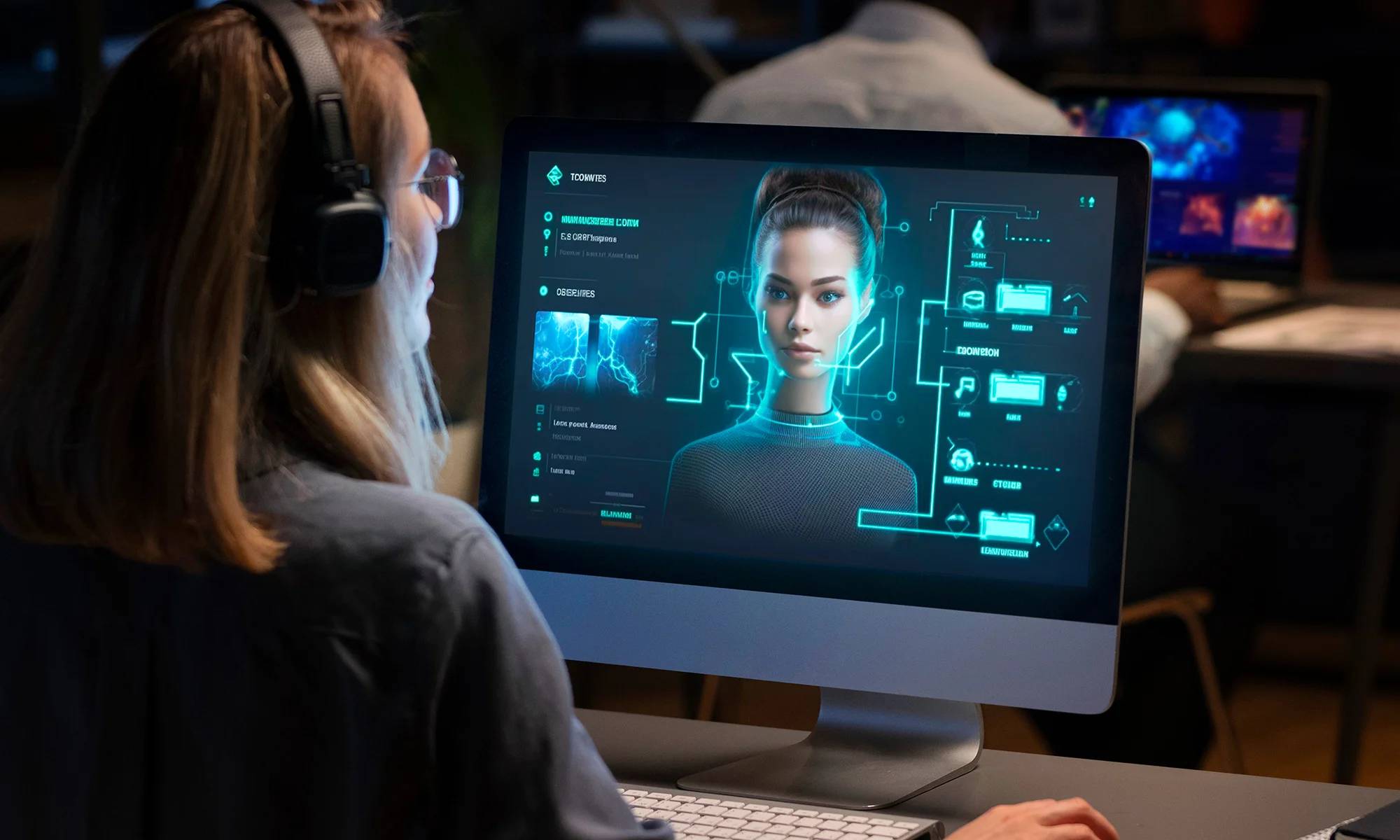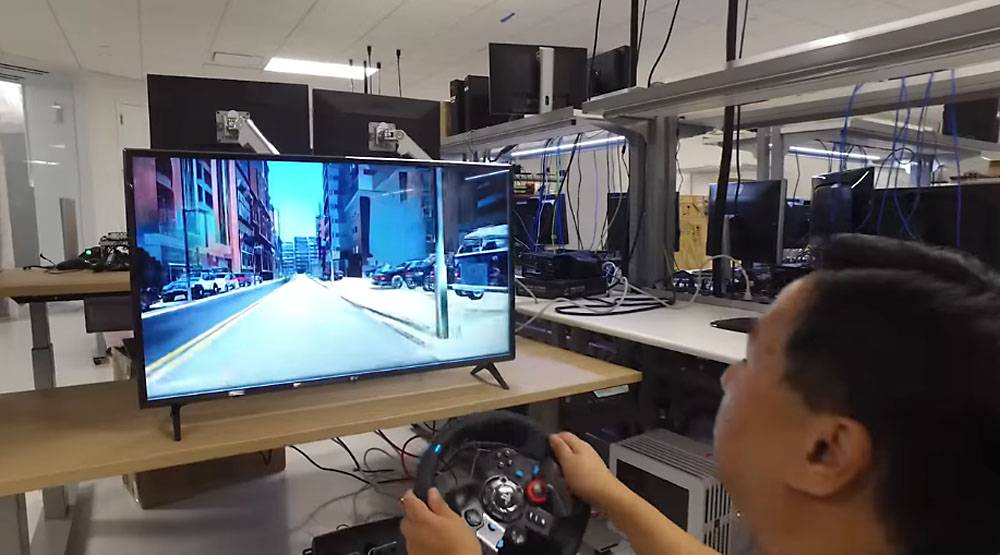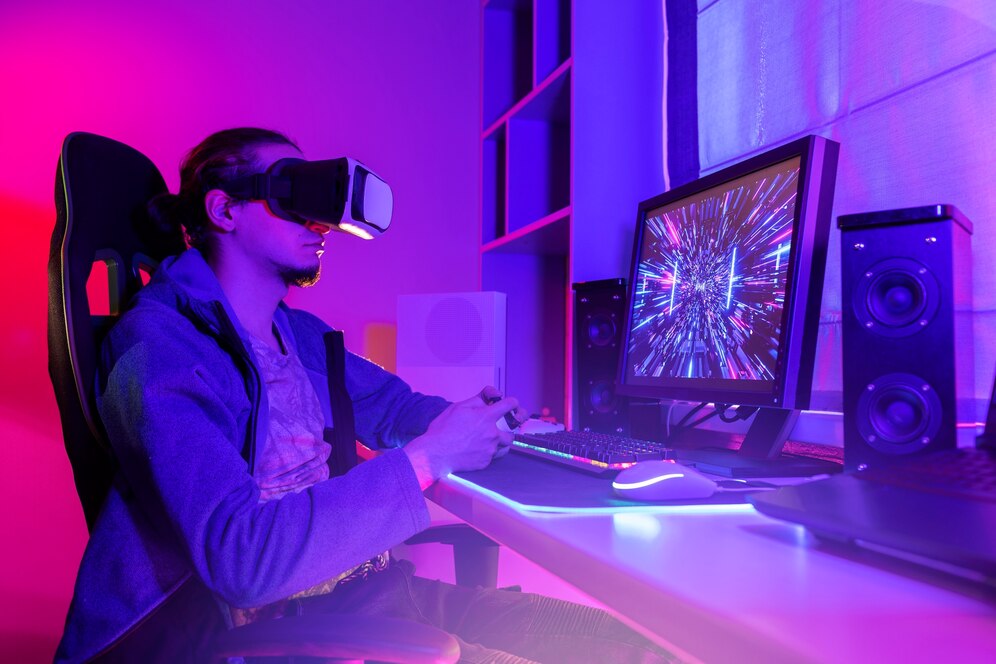The Gaming Blog

How AI is Transforming the Gaming Industry
AI is changing the gaming industry. It enhances game design, player interactions, and creates content automatically. AI is changing immersive gaming in many ways. It improves NPC behaviour and creates adaptive difficulty levels. Developers are using machine learning in video games to create lively and responsive virtual worlds. This gives players a level of realism like never before.
As AI in gaming grows, this guide looks at how it affects game development, gameplay mechanics, and the industry’s future. Developers are using AI tools and automation to explore new frontiers in interactive entertainment.
The Role of AI in Gaming

1. AI-Driven Game Development
Game developers are using AI more and more. It speeds up production, improves design efficiency, and makes games more realistic. AI isn’t just a way to make characters smarter anymore. It’s changing how games are created from the ground up.
- Procedural Content Generation: AI algorithms build large, changing game worlds with unique landscapes, levels, and quests. Examples include No Man’s Sky and Minecraft, where AI generates infinite possibilities. This not only reduces development time but also enhances replayability.
- Automated Testing: AI bots check games for bugs and balance problems. They cut down development time and boost quality control. Machine learning algorithms can run thousands of gameplay scenarios. This helps find possible glitches before launch.
- AI-Assisted Animation: Machine learning makes character animations smoother and more lifelike. This happens without needing a lot of manual effort. Developers can use AI to create realistic facial expressions. This makes in-game characters feel more believable.
2. Smart NPCs and Adaptive Gameplay
AI is changing how non-player characters (NPCs) act. This makes game worlds more immersive and interactive. NPCs are evolving from static, scripted entities to dynamic beings that can respond to players in real time.
- Advanced Enemy AI: Games like The Last of Us Part II use AI to make enemies react intelligently, flank players, and adapt their strategies. Enemies can observe how the player acts. This makes fights tougher and less predictable.
- Dynamic Dialogue Systems: AI lets NPCs reply naturally to player actions. This makes narratives more engaging. AI-driven chatbots and voice synthesis allow for deeper conversations and branching storylines.
- Adaptive Difficulty: Games like Resident Evil 4 change enemy behaviour based on how skilled the player is. This keeps the challenge balanced. Machine learning algorithms monitor how players perform. They then change enemy behaviour or level difficulty based on that.
Machine Learning for Video Games: Enhancing Player Experience

Machine learning is now used in gaming. It helps create personalised experiences, improve AI behaviour, and generate realistic game assets. The ability of AI to analyze vast amounts of player data is leading to more customized gameplay.
1. Personalized Gameplay and AI Learning
- AI-Powered Game Assistants: AI tracks player behaviour to offer strategic suggestions and gameplay tips. Some games now feature AI-driven coaches that help players refine their strategies.
- Custom Difficulty Adjustments: Machine learning analyses player skills and tailors challenges accordingly. This ensures that casual gamers and hardcore players alike can enjoy a game without frustration.
- Player Behaviour Prediction: AI forecasts actions to enhance your gaming experience. This includes enemy spawns and quest suggestions. It can also identify playstyle preferences and suggest in-game items or missions.
2. AI-Generated Graphics and Sound
- Realistic Environments: AI enhances textures, lighting, and physics, creating more lifelike worlds. AI-driven rendering can improve frame rates while maintaining high-quality visuals.
- AI-Powered Music and Sound Effects: Soundtracks change with in-game events, boosting immersion. AI-generated music can create unique soundscapes that adapt to the player’s actions.
- Deep Learning for Animation: AI helps create realistic facial expressions and character movements. Games like Cyberpunk 2077 utilise AI-driven motion capture to enhance realism.
How AI Improves Game Development
1. Reducing Development Costs and Time
- AI automates repetitive tasks, allowing developers to focus on creativity. Designers can use AI to generate assets, such as buildings and landscapes, without manual input.
- AI-powered tools help optimise game design workflows and bug testing. This leads to shorter development cycles and quicker updates for live-service games.
2. Revolutionizing Multiplayer and Online Gaming
- AI Moderation Systems: Games like Valorant use AI to detect and ban toxic players. AI can analyse chat logs and voice communication to identify harmful behaviour.
- Smart Matchmaking: AI boosts matchmaking by studying player actions and skills to form balanced teams. This reduces frustration and ensures fair competition.
- Cheat Detection: Machine learning identifies suspicious activities to maintain fair competition. AI can track abnormal player behaviour, such as aim-bot usage or speed hacks, in real time.
The Future of AI in Gaming

1. AI-Generated Game Worlds
Future AI systems could build whole game worlds. These worlds might include unique quests, storylines, and challenges made just for each player. AI will create changing environments that react to player choices. This makes each playthrough unique.
2. AI-Powered VR and AR Integration
As virtual and augmented reality grow, AI will help make digital experiences more interactive and real.
- AI will let NPCs in VR games talk to players in real-time. They will respond to gestures and speech.
- Augmented reality apps will use AI to create smart overlays. This will improve gaming experiences in the real world.
3. Fully Adaptive AI Companions
AI-driven NPCs will change in real-time. They learn from player actions to offer personalised experiences. Picture a game where your companion learns from your choices and grows a unique personality.
4. AI in Game Storytelling
AI is beginning to play a role in dynamically generating game narratives. AI could create story branches in real time. This way, it can adjust the plot based on each player’s choices.
Challenges and Ethical Considerations
AI in gaming presents thrilling opportunities. However, it also raises challenges and ethical concerns to think about.
- Data Privacy: AI systems require vast amounts of player data to function effectively. Developers must ensure that user data is protected and not misused.
- AI Bias and Fairness: Matchmaking and difficulty changes powered by AI should be designed to prevent unintended biases.
- The Effect on Human Creativity: AI can automate parts of game design. This raises questions about whether it will reduce human creativity in game development.
AI-Powered Gaming: Shaping the Future of Interactive Entertainment
AI in gaming is revolutionising everything from development to player experience. Machine learning in video games boosts realism, personalisation, and efficiency. This is shaping the future of interactive entertainment. AI technology is advancing, which means the gaming industry will have smarter NPCs, dynamic worlds, and smoother gameplay.
The future of AI in gaming is full of possibilities. AI-created worlds and changing storylines are transforming how we play and enjoy games. As AI continues to shape the future of gaming, how do you see this technology evolving in the next decade?









